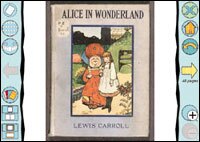A new library on the Web offers children—and their parents and teachers—a place to read children’s books from around the globe.
The International Children’s Digital Library, launched last week at www.icdlbooks.org and with a gala at the Library of Congress here, now has nearly 200 titles selected by national libraries, authors, and publishers representing 45 different cultures.

|
Nearly 200 titles, such as Alice in Wonderland, representing 45 different cultures, are in the International Children’s Digital Library so far. |
It’s aiming for 10,000 children’s books from 100 cultures and thousands of authors within five years. All will be online, fully illustrated, and in their original languages. There will also be some translations.
“We’d like this site used for teaching about diversity and international understanding—but it’s also simply about stories,” said E. Jane White, the director of the San-Francisco-based ICDL, part of a five-year, $3.3 million research project of the Human-Computer Interaction Lab at the University of Maryland.
Children won’t find Harry Potter there—or any fees or advertising. They will find classics such as Heidi by Johanna Spyri, and favorites such as a book from the “I-Spy” series.
But most of the books are regional treasures that are unknown to the rest of the world.
Technological Hurdles
Visitors must cross a few hurdles to enter the library, which requires a high-speed Internet connection—common enough in U.S. schools and a growing number of public libraries, but still fairly rare in homes and throughout much of the world.
Would-be readers must also have a personal or tablet computer with features that have become standard only within the past two years.
The researchers purposely are using technologies that are expected be common five years from now, said Allison Druin, the project co-leader at the lab. More basic access by dial-up modem will be available by next summer.
Among other features, the site allows children to search for books from a certain region by clicking on a globe, or they can find books according to shape, color, language, or even the emotion a book evokes, such as happiness.
They can read the books in various formats— with miniature pages laid out as a storyboard that can be enlarged at will, or arranged in a spiral showing where the selected page falls in the narrative, or presented simply page by page.
Commercial publishers have given books to the ICDL to obtain research on presentation strategies, but also out of a sense of responsibility, said Brewster Kahle, the founder of the Internet Archive, which hosts the library.
“It taps one of the greatest responsibilities we have: to put the best we have to offer in the hands of the next generation,” he said.




